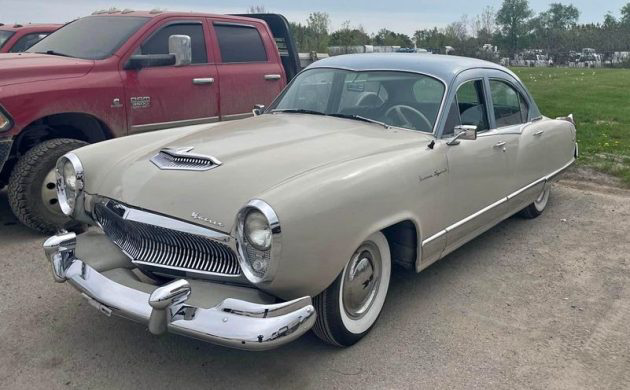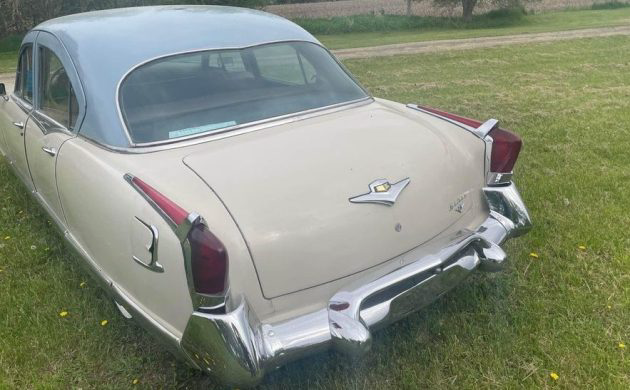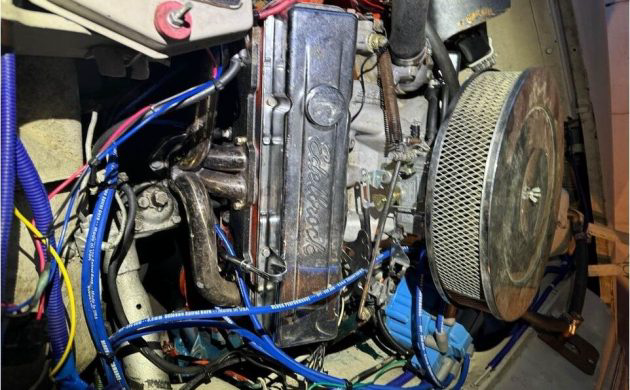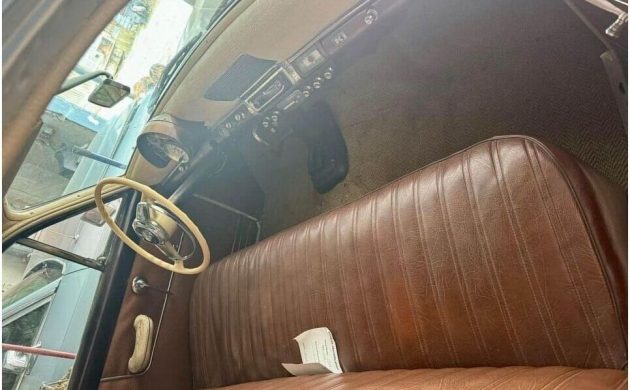When it comes to Kaiser Motors, a lot of the attention seems to focus on the one-year-only Darrin offering the company produced in 1954, a low-production fiberglass two-seater that’s deserving of all the praise it receives. However, the brand was also responsible for some other interesting creations such as this 1954 Kaiser Special sedan, which was once part of the Gilmore Car Museum collection in Hickory Corners, Michigan. The seller says this rarely-seen car draws lots of attention, and if you’ve been looking for something driveable that will be a sure frequent head-turner, this one’s probably worth a look. Ted, thanks for your great tip here!
From the outside, the body seems to be in fine condition and complete, although the owner mentions it could use a fresh coat of paint. Some fun exterior styling touches can be spotted, such as the subtle widow’s peak windshield and rear glass, plus the taillight assemblies with trim extending up the quarter panels nearly as long as the trunk. The front end is also a bit busy, with lots of filler between the grille and low-placed bumper, and even though the presentation is somewhat unusual, the eclectic design comes together nicely. The seller mentions that the wide whitewalls are the same tires from when the Kaiser was residing in the museum.
The factory engine has been pulled in favor of a Chevrolet V8 of the 283 variety, which the seller says has been mildly built. Not too many hints are given as to what’s exactly inside the small block, but the seller includes a video of the engine running, and with the headers and dual pipes, it produces a pleasing throaty rumble from the rear exhaust. There’s a Turbo 350 automatic transmission, and with a shift kit present, I’m guessing this one’s capable of chirping the tires changing from first to second gear.
The interior here seems to be a strong point, at least the part we can see in the one provided photo, with the front seat, door panels, and dash all appearing to be in well-preserved condition. This one’s now located in Carsonville, Michigan, and can be found here on Craigslist, where the price has already been reduced from $12,500 to $11,500. This sounds like a reasonable price for a strong-runner ready to be driven to your local car gathering, although it’s already been listed for 17 weeks with no takers. What are your thoughts here?








Surprised no one has bought this! You can’t get into the hobby any more cheaply than this, especially for something you can drive and enjoy right away.
Certainly agree, but a thought occurred. If the grill had a taste of the same dip as the windshield, would the car have more of an appealing cosmetic “flow?”
Ha! I just flashed on the 1960 Simca Vedette and Versailles!
The 6 cylinder engine that came with this car only produced something like 118 horsepower, so I can understand why someone might want to swap it out. Even though I don’t consider myself a purist, orphan cars are generally more appealing to me in their original state.
Timmy I’m surprised no one has started the whining because it has a SBC
Well here it comes. I looked at this with great interest until I saw the Chevy engine. It is the mark of death in my book
Always wondered what these cars would’ve been like with a V-8 engine from the factory but Kaiser couldn’t
afford to build one for themselves so
they had to coax more power from the 6 cylinder engine instead. But thanks to some adventurous builders,
we know they’re more than likely a real blast to drive. Had Kaiser been able to source such an engine, Kaiser
would’ve been one hot performer. They were well balanced weight wise
and with an SBC Chevy, or something
like it, this car might’ve been a force
to be reckoned with and just may have given their competitors a run for
their money. Only thing I know is that
I like it, I really like it!
Styling ahead of everything else, ergonomic dash, a 1952 fiberglass Darrin roadster…who knows how Kaiser would’ve faired if they only had a V8 as most weren’t sold on the Paxton supercharger/blower.
There weren’t many V8s back then. Chevy didn’t get a V8 until 1955, and even Buick got it’s first V8 in 1953. Kaiser could have possibly sourced one from Cadillac or Mercury, but they may not have been for sale at any price. Packard’s inline 8 would have been a good choice, and maybe reasonably priced. Even after Kaiser continued to build cars in South America, I don’t believe they ever offered an 8.
While I realize my thoughts on swaps like this ruffle some feathers, this is a time when I say it’s okay. It’s okay to do this and makes the car far more appealing. Kaiser had nothing to brag about anyway, and a V8, I believe one was planned, but blew it all on the Henry J. It could have delayed their demise for a couple years. I was reasonably confident an update like this for all older cars, especially horribly anemic ones, would be an instant seller, by all rights, this car should be sold by now. Maybe the hobby has tanked to a point that even a reliable, updated unusual car like this, isn’t enough.
Those of us that like these are into our 80s
Since I was a kid I always liked this Kaiser. Oddball styling appeals to me. In my “collection without walls” the Kaiser, 1950’s Nash, the stepdown Hudson and the early 50’s Packard would be there.
How about the obvious choice Eddie….a Tucker? LOL
yes this is a very nice car and a true collectible even though not the original engine will have much pep with the v-8 and a fair price considering what others are trying to get for JUNK the hobby has gotten out of control people who are greedy and we see many cars that are overpriced for sure??
There was one of these in the rear lot of a car stealership in St Petersburg Florida in about 1977 or so. My friend saw the rear seat ashtray, located in the middle of the back of the front seat. It was a rather large chrome one with Kaiser in script on it. He was going to take it as a souvenir. I begged him not to, as the car could be restored and the new owner would have a hard time finding a replacement. He left it there.
Fast forward to a few years ago, I was at a local car show and saw one of these cars. The owner was standing next to it so I walked over and shared the story with him. He was hysterical, as this WAS the very car! He was sooo appreciative, lol
What a GREAT story!!! (My parents first 2 cars were Kaisers and they drove one cross-country from PA to CA).
It’s not whining regarding the SBC. Replacing the 226 Continental was a mistake. 118 HP was ok for people back then and is fine for 50 mph roads. Kaiser is hardly a street rod and its value would be in its original state. Of course it’s just my take but seems others have agreed.
I have a ’53 Manhattan with the 6 and a 3 spd manual w/overdrive and exactly what I wanted. No complaints about its power abd it does a comfortable 60. Very comfortable car to drive without power steering or power brakes. 93k
As I understand, with poor sales in ’54 Henry J Kaiser had a chance to build his own V-8 but fired the fellow as he decided to go to South America. Interestingly enough this engineer was quickly hired by the new AMC corp which came out with their 1st in house engine the 357 cu. in. Also, AMC was buying Packard V-8’s too to compete for the time being.
I stand corrected as AMC’s 1st in house V-8 was a 327 cu.in which was very powerfull at the time.
The motor could have been replaced with a new Continental motor from the factory in Harrisburg, PA since they were still making them at least when I heard about this in the early 1990’s.
You have to be able to do 75, all day, on today’s Interstates. The major problem with this car, when new, was its lack of power, even a Chevy 6, let alone a Ford, Olds, Pontiac 8, had more guts – overdrive helped on the flatland but not on the hills, So an SBC makes it safe to drive at 70+ all day, the windshield pops out in a crash so your head would not go through and get cut off from your body. Put in seat belts, a dual master cylinder, new radial tires, and drive it at 75 mph. The fit and finish were better than a Ford or Chevy of the period. A museum (and a good one) got rid of it, it is no longer a museum piece, and there are enough around for the museums, so have a good time with it. I am reminded of a friend with a ’52 MG TD in such perfect conditon that he did not dare to drive it, underpowered for today’s highways, no protection in a crash, a victim of other car doors in the parking lots, it just sat in the garage, and I suspect now, in 2024, losing value.
Not sure what the rear gears are, but an OD may be needed for 75 all day. Most of these types of cars were geared pretty low for any kind of acceleration.
I googled it and one source listed rear gearing at 3.91:1
I really enjoy the history of american Independent cars! what killed them off was the big 3 esp in ’53 when ford and chevy were in a price war. Also, tooling up for new V-8’s was a big cost factor. Frankly, they were all good built cars back then! Unfortunately George Mason wanted all the independents to merge into one corp. so as to survive and compete! He was so right but with big egos from the other ceo’s it never happenned as Mason died. Sure Packard and stude merged & you see what happenned to them. AMC was the last and they deserve credit as they built economy cars, luxury, to muscle cars! Kaiser/Frazier did build great cars back then! Shame all the independents are long gone.
“They were all good built cars back then”.
Not true at all. Typical car needed a valve job at 40,000 miles and engine rebuild at 100,000. Every service station carried fan belts because they broke, wore out.
American cars for the most part were not well built until they had to compete against the well built cars of Japan. I bought a new Chevy Traverse SUV in 2020 and this year at around 40,000 I had to add a qt of oil. I recently complained to the Chevy dealer about this last week and the service writer informed me that GM states that the Chevy engines are expected to use 2.5 quarts of oil every 5,000 miles. I never had to add a drop of oil to my Toyota Yaris or Honda Fit.
On e my Honda Civic got 165000 miles on it it started burning oil and transmission slipping. Before that, it hardly used any oil between changes. My daughter’s Corolla and RAV4 both had the Toyota mystery malady of using oil without any smoke from the exhaust or any leaks. It just, disappeared. My Buick Verano is going to be twelve years old in December. It uses some oil between changes but runs fine. AC still blows cold and gets 26mpg combined. Some electronic gremlins in the infotainment center that got fixed by magic.
I must disagree. 1st, oil itself has come a long ways as far as protection, and advances in metal and design, not even thought of as you zip along in your Honda Fit( shudder), yes, 100,000 miles was a major milestone back then, for ALL cars. 2nd, 100,000 miles was practically unheard of then, as most trips were local, and flathead 6s did just fine for that. Finally, modern imports kicked out butts as far as reliability, and far as I’m concerned, still do to this day. I’m not sure 1950s imports were any more reliable than our cars.
Those of us that like these are into our 80s
Frankly, its true the Japanese car makers retaught us how to improve quality that was missing in usa cars by the late 60′ and early 70’s! It was Lee Iacocca who when he took over Chrysler said he wanted Japanese quality with german performance, etc. As a result, all usa makers had to improve as for the price of Japanese cars plus their economy was hard to beat.I still enjoy the old car hobby because its part of our history! and lets face it all manufacturers all have recalls.